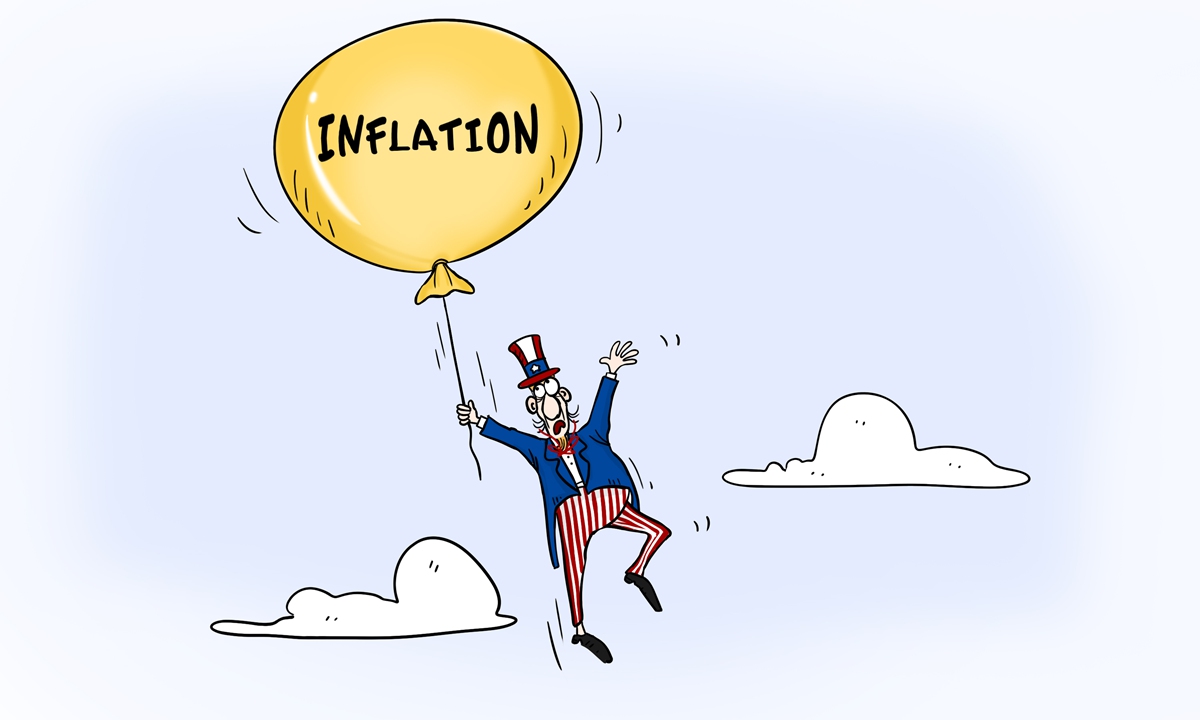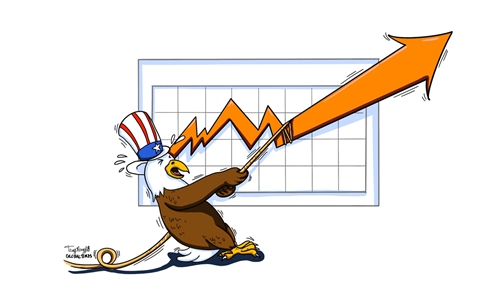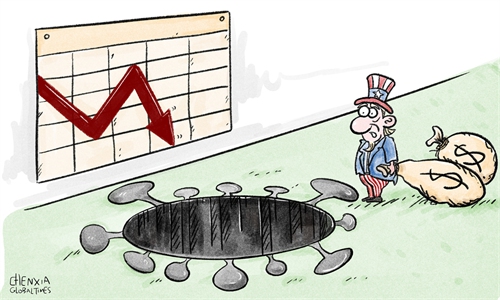COMMENTS / EXPERT ASSESSMENT
Tackling inflation is biggest challenge for Biden

Illustration: Chen Xia/Global Times
The Biden administration is facing growing pressure to tame skyrocketing inflation and other economic woes that cast a cloud over upcoming mid-term elections in 2022. If the Republican Party takes back even one chamber of the US Congress next year, Biden's domestic "Build Back Better" agenda, through heavy fiscal spending, will hit the wall, and his legislative plan to tax the rich and aid the poor to narrow severe rich-poor inequality will also be thrown out.Coping with sharply rising prices of food, fuel, homes and rents and more, so that American voters won't feel their pocketbooks and well-being are diminished is the biggest challenge facing US President Joe Biden now.
Over the past months, the White House and the Federal Reserve have repeatedly asserted that high inflation is only temporary or "transitory", a proclamation which is being increasingly tested by the market. American economists say the inflation will be persisting, and might exacerbate if the US central bank fails to act quickly by tapering its huge bonds purchasing programs.
Inflation in the US jumped by 5.4 percent in September, the US Labor Department said last week, reaching a 13-year high and more than doubling the Federal Reserve's set target of 2 percent. American economists predict the worst is yet to come, as the inflation is almost certain to extend to the first half of 2022, eroding the purchase power of American households across the board.
According to figures from the Labor Department, prices for beef, pork and chicken are up 17.5 percent over the last 12 months. Major appliances are up 9.6 percent more expensive, while furniture and bedding rose 11.2 percent. New vehicles prices have surged more than 24 percent. Crude oil prices have doubled since the November election and now hovered above $80 a barrel, which has spilled over into gasoline prices paid by American voters, with the national average for a gallon at the pump up more than $1.
Ironically, the Biden administration, bent on global climate change, is "speaking with the US oil and gas producers" about "helping to bring down rising fuel costs" to quell public discontent, according to US media reports.
If food, utilities, electronics, durables and shelter prices continue to rise in cost, it could mean the pressure will continue to amount on the White House to urgently act to stave off a round of ferocious inflation. Do not forget that inflation is one of the broadest accelerators of income inequality, which is therefore fiercely opposed by the poor and the middle class in all countries in the world.
For instance, the CPI measure of home rent is up 0.5 percent just between August and September, the fastest pace in more than 10 years. As rental costs heat up in big cities including New York, Chicago and Los Angeles, renters are launching a bidding war for a limited supply of homes, and there always be cases in which a renter who can't pay the prices will be evicted. Sometimes within the same building "a tale of two cities" is happening.
Americans' complaints about price hikes are growing louder as their unhappiness builds. Just 10 months into office, the Biden-Harris administration, boosted by fellow Democrats' control over both chambers of Congress, has failed to address concerns by Americans over the country's stalling economy, while inflation is surging, supply chain bottlenecks are getting worse, and shortages are everywhere. Some have accused the Federal Reserve has become too politicized and refused to raise interest rates for the fear of pricking the stock market bubble in the US.
Biden has ordered the two busiest ports on the Californian coastline and the logistical system including Walmart, UPS and FedEx to work 24/7 per day to ease shipping backlog and speed up transporting imported goods and materials to shopping malls and American manufacturers, but logistical logjam at the shipping lines is only partially responsible for the price rises.
The major culprit for the elevated inflation is the extraordinarily loose monetary and fiscal policy taken by the US government to fire up its economic growth and dig out of a pandemic-induced recession.
An incomplete statistics showed the world's 20 major economies spent roughly $10 trillion to jumpstart their economies since 2020, half of that liquidity was released by the US alone. With that lofty $5 trillion being injected to the financial market, it is no wonder that inflation is skyrocketing. To makes things worse, the White House is aiming to dish out billions of dollars in generous stimulus checks.
The US central bank, encouraged by the White House, has been pursuing one of the most radical monetary experiments in history since early 2020 when the coronavirus hit the US. The injection of funds in the early pandemic days to buoy the damaged economy is warranted, but the Federal Reserve is problematic to stubbornly maintain the same loose monetary policy for some 19 months after the economy has largely recovered to pre-pandemic level of growth.
Lately, some Fed officials signaled they could start reducing massive bond-buying program in middle November to alter policy to head off inflation, and in 2022 the central bank could begin raising interest rates which has been kept at nearly zero after the 2008-09 financial crisis.
Economists say that higher tariffs imposed by the US government on $370 billion imported Chinese goods is another major contributing factor for increased commodity prices across the US market places. The Biden administration inherited the tariff policy from his predecessor Donald Trump, and there are broader grievances among American manufacturers and wholesalers that the levies are hurting their business and impacting Americans' buying power.
Now it is right time for Biden to give it a serious rendering and abolish the double-edged trade policy that has hamstrung both economies. Of the same logic, the US government ought to do away with its technology conflict with China because it has led to serious global supply line disruptions, represented by the dearth of semiconductors.
The author is an editor with the Global Times. bizopinion@globaltimes.com.cn


